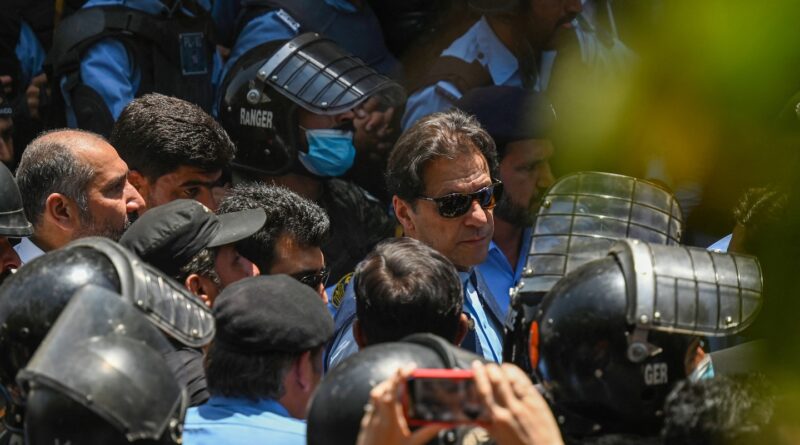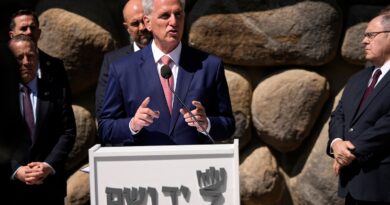For second time in 24 hours, ex-Pakistani leader Khan sentenced to prison
According to Pakistani authorities, the timing of the sudden prison sentences, which came just over a week ahead of general elections in the country on Feb. 8, is coincidental.
But Khan’s party, the Pakistan Tehreek-e-Insaf (PTI), and allies of the still-popular former leader argue that Wednesday’s prison sentence proves that the upcoming vote is unlikely to be fair.
“It sends a very clear message,” said Hasan Askari Rizvi, a political analyst. “The PTI won’t be allowed to come into power again.”
In addition to prison terms, this week’s sentences mandated long bans on Khan being allowed to hold public office. Chances are close to zero that the former leader will be allowed to run in next week’s election, despite pending appeals. And while other PTI politicians are allowed to campaign as independent candidates, some are expected to switch allegiances to parties that will face less scrutiny.
Wednesday’s case centered around accusations that Khan and his wife Bushra Bibi retained state gifts from foreign dignitaries. Khan’s wife was also sentenced to 14 years in prison on Wednesday and turned herself in, the PTI said in a statement. Among the items that Khan and his wife are accused of having improperly retained are Rolex watches, perfumes, earrings and other jewelry.
The case on Tuesday revolved around Khan having in early 2022 publicized details of a secret diplomatic cable that the former prime minister said proved the United States was behind efforts to oust him.
Khan is not the first former Pakistani leader to be buried under a wave of lawsuits and to have his party slowly dismantled. Pakistan has a long history of former prime ministers who appeared to have fallen afoul of the nation’s powerful military being convicted and imprisoned.
Many of them, including the most likely next prime minister, Nawaz Sharif, have managed to stage a political comeback after repairing relations with the establishment.
During his third term as prime minister, in 2017, Sharif was forced out amid corruption allegations, paving the way for Khan, the erstwhile cricket star, to take power the following year on an anti-corruption platform. Initially, he was widely seen as being backed by the military.
As prime minister, however, Khan clashed with the military leadership over nominees for key army positions and allegations that his government was failing to address soaring inflation and debt. Khan’s criticism of Pakistan’s top generals was unusually blunt and frequent, and it continued after he was ousted by parliament in April 2022, straining relations to an extent that has rarely been seen in recent decades.
The stakes for whoever will lead the next Pakistani government are even higher now than when Khan was ousted. Economic growth has been sluggish and inflation has surged further, while relations with neighboring countries have soured amid unrest in the Middle East and escalating militant attacks in western Pakistan.
While Khan now faces similar accusations as Sharif did at the time, an additional complication for Pakistan’s next leader will be that Khan still has deep support across the country, judging by rallies he held last year.
Sohail Warraich, a Pakistani political scientist, said the wave of court cases involving Khan is not surprising in a country that has long been a “hybrid state,” with power being shared by civilian and military leaders.
The clear signal that Khan’s party will not be allowed to regain power is likely to impact swing voters who “usually move toward the likely winning party,” said Warraich. But the frustration of Khan’s allies could also strengthen their resolve, he cautioned. Instead of calming tensions, the Feb. 8 vote could exacerbate them.
In a statement, Khan’s party said Wednesday that it views this week’s court decisions as “an attempt to provoke supporters to stage protests paving way to sabotage electoral process.” When Khan was first arrested last May, Pakistani authorities accused his supporters of organizing riots across Pakistan and of targeting installations of the country’s powerful military. Thousands of people were arrested.
Khan’s party appealed to its supporters to refrain from rallying publicly to support their leader on Wednesday, saying it did not want to provide the Pakistani establishment with a pretext to crack down further on them. The party’s central headquarters in the capital city of Islamabad were cordoned off by police, the party said.
Pakistani authorities deny that they have imposed heavy restrictions on the PTI’s campaign in this upcoming election, but have acknowledged targeted measures by citing the risk of more violence and protests.
Noack reported from Kabul.



